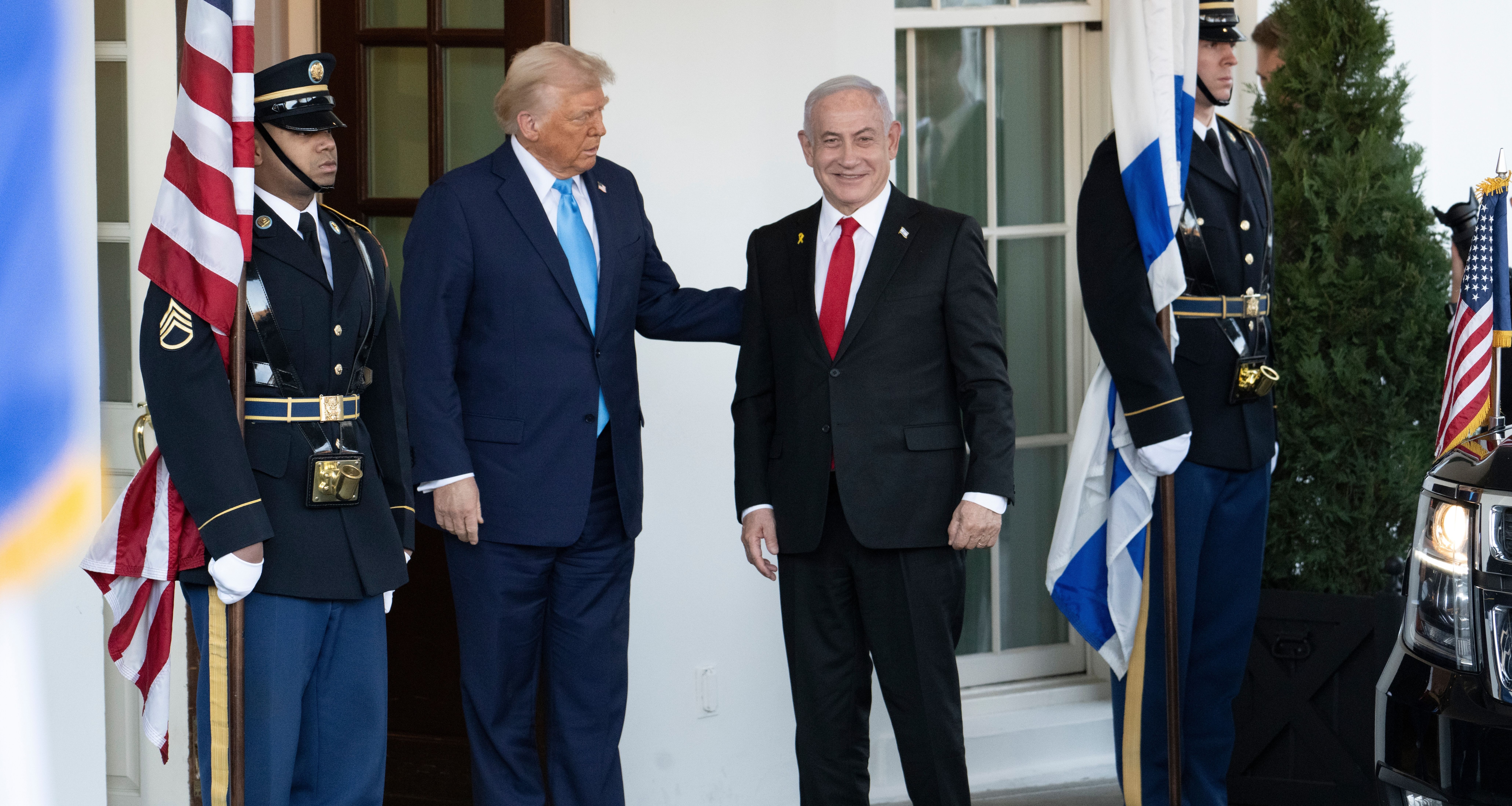The cease-fire agreement on the Gaza Strip is on the verge of dissolving, for reasons that were predictable when the agreement was reached in January.
To follow an initial six-week phase, which has just concluded, the agreement envisioned second and third phases that would see the additional release of hostages by both sides, Israeli military withdrawals from the Strip, and a reconstruction plan. But those parts of the agreement were mere outlines or statements of objectives, with further negotiations needed to resolve all the details.
As addressed in Responsible Statecraft when the agreement was announced, Israeli Prime Minister Benjamin Netanyahu has strong personal and political reasons to keep Israel at war, including his need to maintain a coalition with extreme right-wingers in his government whose policy on Gaza is to eliminate all Palestinians from the Strip.
Netanyahu thus has had incentives to sabotage the cease-fire agreement before its implementation could proceed to a permanent cessation of hostilities.
Such sabotage is well under way. Israel has frequently violated the cease-fire throughout phase one with air and ground attacks that have inflicted casualties. With Hamas not taking the bait of responding with full-scale hostilities, Netanyahu is now trying to junk the entire second and third phases of the agreement and replace it with something more to Israel’s liking. Instead of negotiating the details of phase two, as required by the agreement, Netanyahu is pushing a formula that includes a 50-day cease-fire, by the end of which all the Israeli hostages would be released.
With no provision in Netanyahu’s proposal for either an Israeli military withdrawal from Gaza or a permanent cessation of hostilities, the formula is an obvious non-starter for Hamas. It would be giving up its remaining bargaining chips for nothing in return. Hamas described Netanyahu’s proposal as “a blatant attempt to renege on the agreement and evade negotiations for its second phase.”
Meanwhile, other Israeli violations of the January agreement continue. Last week Israel indicated that it will not withdraw its forces, as stipulated in the agreement, from the Philadelphi corridor, an area along the border between the Gaza Strip and Egypt. This week Israel began blocking all humanitarian aid from entering the Gaza Strip.
The incentives for Netanyahu to resume Israel’s assault on Gaza rather than see an agreement through to lasting peace are at least as strong now as they were in mid-January. The biggest factor in this equation is the Trump administration’s deference to Israeli preferences, as reflected in Netanyahu’s smiling face after hearing that President Trump is just as much in favor of complete ethnic cleansing of the Gaza Strip as the extremists in Netanyahu’s government are.
And those extremists are as gung-ho as ever about resuming the devastating assault on the residents of the Gaza Strip after first starving them and cutting off their supplies of water and electricity.
The most likely near-term scenario for the Gaza Strip is thus a resumption of the Israeli military assault. Such a resumption will have no more chance of achieving the declared Israeli objective of “destroying Hamas” than the earlier 15 months of devastation did.
As for the suffering civilian population of Gaza, notwithstanding any resentment against Hamas for its decision to launch the October 2023 attack on Israel, those civilians have been given no attractive alternative to continued resistance. Whoever might someday enjoy Trump’s vision of a “Riviera of the Middle East” in Gaza, it will not be the Palestinians who currently live there. They would instead face squalor in exile, and even then would not be safe from more Israeli attacks.
The original January agreement, notwithstanding all its weaknesses, represented the best that international diplomacy could produce at the time for immediate management of the Gaza tragedy. The fact that the accord was reached only after many weeks of mediation and negotiation shows that it was the most that could be squeezed from the parties — including from Hamas, despite the battering it had taken during more than a year of war.
The United States has the leverage, especially given its voluminous military aid to Israel, to create incentives for the agreement to remain in force and for serious negotiations on phases two and three to occur. Clearly the Trump administration is not using that leverage. In fact, Netanyahu says that his alternative formula for a temporary cease-fire with no permanent end of hostilities and no Israeli withdrawal was a framework proposed by Trump’s Middle East envoy Steve Witcoff — the same Steve Witcoff who had been given credit for brokering the original January agreement.
In addition to implications for the suffering people of Gaza, this turn by the administration has implications for U.S. credibility. For the United States to help destroy an agreement that the same U.S. administration — and even the same U.S. envoy — had helped to negotiate will amplify foreign doubts, already present because of the administration’s similar reversals regarding international trade, about the ability and willingness of the United States to abide by its commitments.
If alternatives to the January agreement on Gaza are to be considered, certainly one should look at what the Arab states are doing. The Arabs have had some challenges getting their collective act together, mainly because of different attitudes toward Hamas and political Islamism generally, but at a just-concluded summit meeting in Cairo they endorsed an Egyptian plan that addresses reconstruction and temporary administration of the Gaza Strip.
Egypt’s proposal calls for a technocratic, nonpartisan Palestinian committee to administer the Strip during a six-month transition. Hamas welcomed the proposal, a posture consistent with earlier indications that the group is not anxious to keep administering Gaza itself, even if it will continue to resist unilateral disarmament of its military capability. Israel rejected the proposal, consistent with its opposition to anything that hints at a path toward Palestinian self-governance.
The Trump administration brushed aside the Egyptian proposal and reiterated its support for Trump’s Riviera-in-Gaza idea. The White House spokesman also repeated the administration’s bizarre line that because “Gaza is currently uninhabitable,” this somehow is a reason to support the policies of the state that made Gaza uninhabitable.
The White House confirmed this week that the administration has held secret talks with Hamas, in a contact that evidently focused on release of hostages and especially American hostages. The fact that the U.S. official involved was the special representative for hostage affairs rather than Witcoff implies such an agenda. There is no indication that the broader administration position changed, with President Trump issuing a bellicose statement threatening Hamas and saying that he is “sending Israel everything it needs to finish the job” in Gaza.
Although the Egyptian proposal deserves attention for dealing with the immediate situation, calls for the Arabs to come up with their own ideas are somewhat strange given that the Arab League produced more than two decades ago a peace proposal that offers peace and full recognition of Israel by all Arab states if Israel ends its occupation of Palestinian territories and accepts a Palestinian state.
That proposal is still on the table.
- Biden worked 'tirelessly around the clock' — to prevent a ceasefire ›
- Who should take credit for the ceasefire? Netanyahu. ›
- The Gaza ceasefire likely won't last ›
- Ceasefire collapse expands Israel's endless and boundary-less war | Responsible Statecraft ›
- Trump appears all in for Netanyahu's political survival | Responsible Statecraft ›
- Is Trump orbit rolling out red carpet for Israeli extremist Ben Gvir? | Responsible Statecraft ›
- Netanyahu’s ‘total victory’ rhetoric takes an extreme turn | Responsible Statecraft ›
- Is this Trump’s ‘Mission Accomplished’ moment? | Responsible Statecraft ›
















